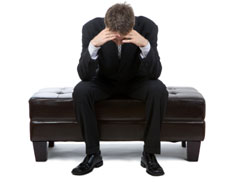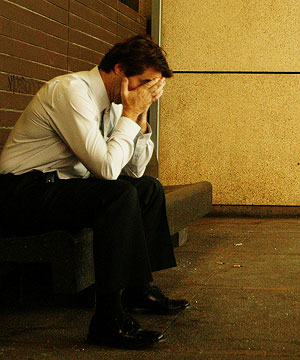 Men are notoriously lax when it comes to seeking out a doctor for minor physical ailments. Only when they are pushed by spouses, friend or family members will some men finally take the plunge and go to a doctor. Unfortunately, the same can hold true when male depression symptoms become apparent. Just as in women or teens, men often ignore signs of depression. But, whereas these groups will accept that they have problems in early stages, the male determination that, “there’s nothing wrong with me” will often cause males to resist diagnosis and treatment until the male symptoms of depression cause harm to themselves or others.
Men are notoriously lax when it comes to seeking out a doctor for minor physical ailments. Only when they are pushed by spouses, friend or family members will some men finally take the plunge and go to a doctor. Unfortunately, the same can hold true when male depression symptoms become apparent. Just as in women or teens, men often ignore signs of depression. But, whereas these groups will accept that they have problems in early stages, the male determination that, “there’s nothing wrong with me” will often cause males to resist diagnosis and treatment until the male symptoms of depression cause harm to themselves or others.
Male Depression Symptoms
Symptoms occurring in males may exist for years without being diagnosed. Often, those in their lives simply attribute certain behaviors as simply part of their personality. Because signs of depression may slip past, men are the largest sector of the population to commit suicide. Other reasons factor into that situation but men’s stern defense of themselves and pride are certainly part of the issue. Common male depression symptoms range widely from individual to individual but, there are four key groupings indicating roots in depression:
-
Risky Behavior — Sudden risky activities may be triggered by underlying depression. Sudden decisions to engage in gambling, heavy drinking, speeding and reckless driving, challenging others in physical altercations, confrontations with superiors or casual sexual relationships can indicate depression.
-
Anger — Showing a short temper at work or home, striking out at small criticisms, road rage, physical abuse toward friends or family are signs of deep-seated problems.

-
Pain — Physical manifestations of joint or back pain, constant headaches that have no logical or apparent causes are another signal of male depression symptoms.
-
Avoidance/Isolation — Breaking off social activities, being late for work or appointments, avoiding contact with other persons, excessive sleeping and sitting, doing nothing more that staring off into space as if in a daze are efforts to engage in isolation.
Early diagnosis of such symptoms and getting males into treatment and counseling for depression are often difficult, but necessary steps. Once they reach a certain, stage, friends, family or coworkers should confront the individual and persuade them to seek help. Males with depression, once reached can be helped by therapists carefully establishing a bond of trust that is not a threat to their maleness but a connection back to the outside world.
*The information provided in this article is for informational purposes only. Never substitute, disregard, or delay seeking professional medical advice and assistance for any health or mental issue(s) you have or are concerned about because of something you have read.